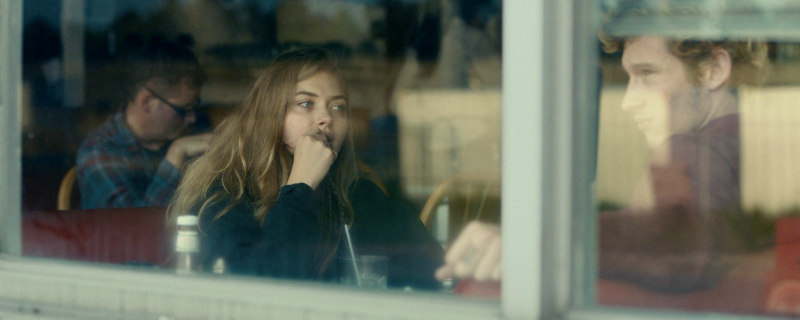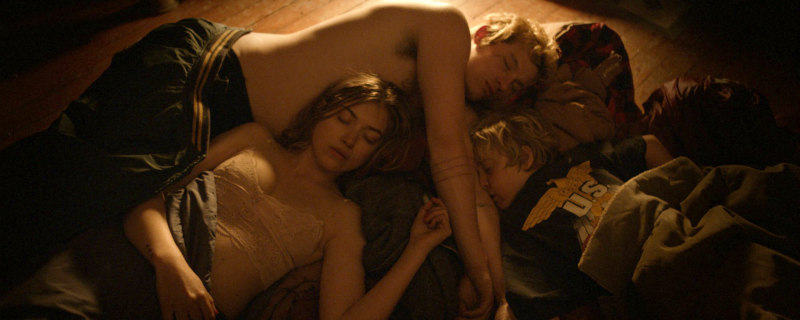
Review by Eric Hillis
Directed by: Vladimir de Fontenay
Starring: Imogen Poots, Callum Turner, Callum Keith Rennie, Frank Oulton

The most ingenious restaurant scam I ever encountered was related by David Niven in his wildly entertaining auto-biography, 'The Moon's a Balloon'. As a way of enjoying a slap up meal for the price of a coffee, Niven and a friend concocted the following con: One man would enter a busy restaurant, take a seat and order a coffee. After a few minutes his companion would take a seat at the same table and, while failing to acknowledge his friend, would order a main course. When the meal was finished the first man would ask the waitress for his bill, at which point the first man also requests his bill. The second man, who just enjoyed a fulsome feed, would take the first man's bill, paying for a cup of coffee rather than a main course. Then the second man would alert the waitress that he's been given an incorrect bill, as he merely had a cup of coffee, not the main course listed on his bill. The two men would then repeat the scam at a second restaurant, swapping roles so both men would enjoy a main course for the price of a cup of coffee.
The restaurant scam employed by the protagonists of Mobile Homes is far less sophisticated. Nicknamed the "dine and dash," it simply involves one diner leaving the restaurant first, with the other waiting a few minutes before making a dash for freedom. Our anti-heroes don't think it through too well, failing at a key point to agree on where to meet post-dash. The haphazard and ill thought out nature of this scam reflects the approach taken by first time French writer/director Vladimir de Fontenay, who seems intent on wallowing in North America's peculiar brand of poverty on the most superficial of levels.

De Fontenay gives us a protagonist in dire straits in Ali (Imogen Poots), a young mother struggling with an eight-year-old son, Bone (Frank Oulton), and hooked up with the no-good but scuzzily handsome Evan (Callum Turner, a million miles from the tuxedo wearing James Bond, a role he's been much touted for).
When we meet Ali first, she's attempting to offload Bone to social services, but finds bureaucracy standing in her way. We soon realise why she is so keen to remove her child from her environment, as Evan has recruited the boy as a pint-sized drug dealer.
During an illegal cockfight, at which Bone is put to work offloading tablets to the gathered patrons, the cops mount a mass raid. Attempting to save his own skin, Evan runs for it, leaving Ali to rescue Bone before the cops nab him with a bag full of pills. That night, Ali and Bone hide out in a mobile home, only to wake the next morning and find it's been attached to a truck and they're halfway across the state. Rather than panic, Ali sees this as an opportunity for a fresh break from Evan, but how long can she outrun the scuzzball?

The American working class milieu, often crudely described as 'white trash', has long attracted European filmmakers. A recent successful example is Andrea Arnold's American Honey, which introduced us to a crew of destitute young people selling magazine subscriptions on a seemingly never-ending road trip. Arnold clearly cared about her protagonists, and never employed them in a condescending manner. Too often however, such films descend into the realm of 'poverty porn', and can feel as though they're designed to make middle class audiences feel relieved that they've escaped such a life.
Whether intentional or not, that's the case with de Fontenay's debut. Ali, Evan and Bone never feel like anything more than stereotypes - the angelic single mother seeking a better life; the bad boy she can't tear herself away from; and the cherub caught between them. So shallowly rendered are they that for the film's first half hour I was confused as to whether the film was playing out in linear fashion or whether de Fontenay was employing flashbacks and flash forwards. It has to be said that the three actors make a valiant stab at making something of their characters, with Poots reaffirming her status as one of the most under-appreciated young actresses currently working.

The story is paper thin, which is fine if de Fontenay favoured character over plot, but that doesn't appear to be the case, as he never allows us to spend any quality time with his protagonists. In the third act, the movie presents us with a striking image - that of Ali driving a truck with a mobile home in tow at high speed down a precarious, icy back road - and it's impossible not to surmise that this image was de Fontenay's starting point and perhaps sole motivation for his movie. The story and characters he crudely fashions around his central image lack the sufficient depth to justify following Ali and Bone on their journey through this Frenchman's one-dimensional vision of working class America.


